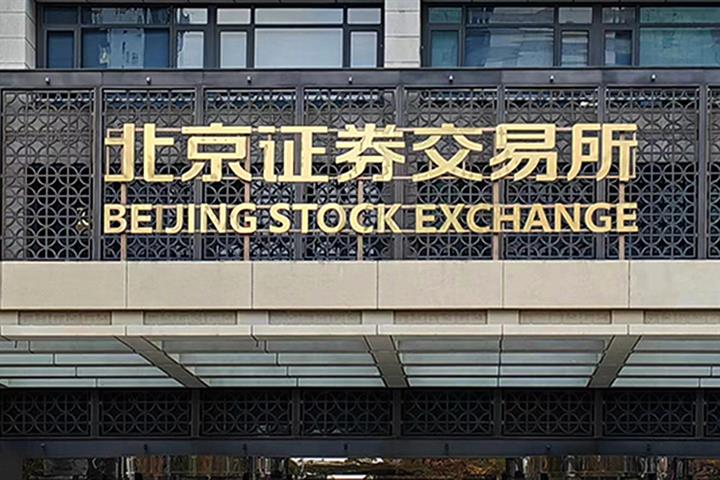 Beijing Bourse Turns One; More Funds Buy In But It Still Lags Behind China's Other Exchanges
Beijing Bourse Turns One; More Funds Buy In But It Still Lags Behind China's Other Exchanges(Yicai Global) Sept. 6 -- One year after the Beijing Stock Exchange launched, an increasing number of funds are buying into companies listed in Beijing, but the bourse, which mainly targets small and medium-sized enterprises in emerging fields such as new materials and biomedicine, still has a long way to go to catch up with the Shanghai and Shenzhen stock exchanges.
There are now 110 companies that have gone public on the Beijing Stock Exchange, which was formed on Sept. 3 last year, with a total market capitalization of CNY187.9 billion (USD27.1 billion), according to the bourse’s first-half financial report.
Many funds have included Beijing-listed firms in their portfolios over the past year. Some 565 funds had stakes in 61 companies listed in Beijing as of the end of the first half, worth CNY6.9 billion (USD994 million), the report said.
And 27 Beijing-listed firms appear in the top 10 heavyweight stocks of these 565 funds. The funds’ stakes in these firms amount to CNY3.6 billion (USD518.8 million). The top five are electric car battery raw material supplier BTR New Material Group, in which the funds have bought CNY1.9 billion (USD273.8 million) worth of equity, carbon fiber products developer Jilin Tangu Carbon Fiber with CNY493 million (USD71.2 million), photovoltaic and semiconductor device maker Linton Technologies Group with CNY305 million, battery supplier Sichuan Changhong New Energy Technology with CNY246 million and agricultural chemical producer Nutrichem with CNY127 million.
Ten asset managers have set up theme funds that invested in the Beijing exchange since November last year. Theme funds can invest in the bourse through initial public offerings, strategic allotments and private placements, a fund manager told Yicai Global.
However, compared to the main stock exchanges in Shanghai and Shenzhen, there are not a lot of companies listed in Beijing, Li Tao, a fund manager at Harvest Fund, told Yicai Global. Their price-to-earnings ratio and price-to-book ratio is much lower than those on Shenzhen’s Nasdaq-style ChiNext Board and Shanghai’s Star Market. It takes time to cultivate suitable investors, he added.
“The market capitalization of firms on the Beijing stock exchange is less than that in Shenzhen and Shanghai mainly because there is less liquidity on the Beijing bourse,” said Lei Jiayuan, a manager at Southern Asset Management. “But leading companies listed in Beijing are just as competitive as their peers on the other two bourses.”
Investors find it challenging to invest in the Beijing bourse because many of the companies listed on it are startups without a strong revenue stream and their business performance fluctuates greatly, said Han Bing, a fund manager at China Merchants Fund. Investing in them is similar to angel investment and so transactions on the Beijing bourse are still low.
Editors: Tang Shihua, Kim Taylor